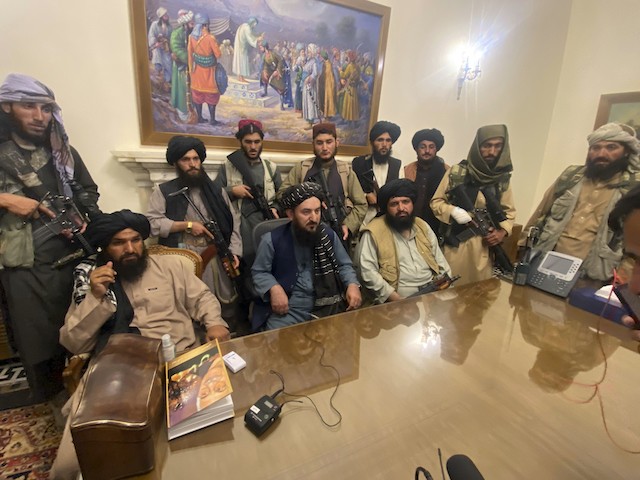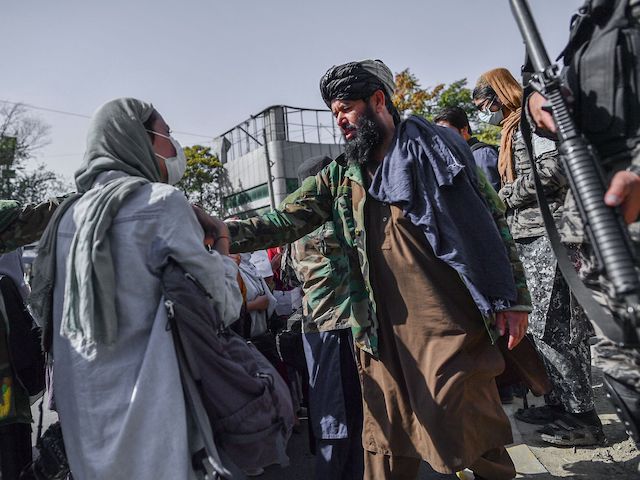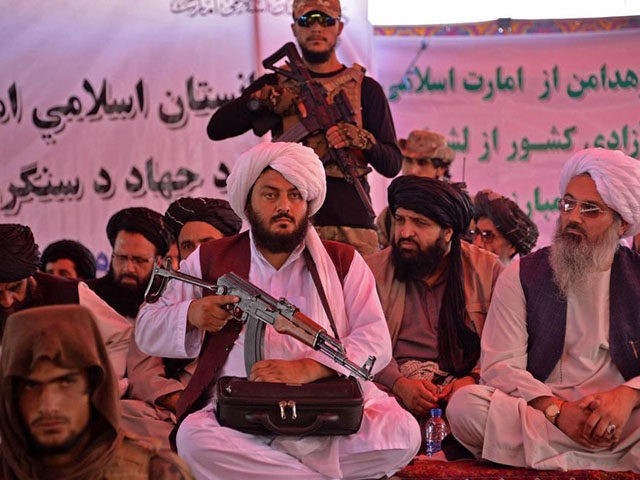Chinese and Iranian diplomats both referred to the Taliban terrorist organization on Wednesday as a “government” – modifying the term with words like “interim” or “caretaker” – suggesting both rogue regimes have accepted the group’s legitimacy as a state entity.
The Taliban invaded and conquered Kabul, the capital of Afghanistan, on August 15. The fall of the capital occurred after the jihadists stormed the rest of the country and seized power with little resistance from the Afghan military, in a campaign launched in response to President Joe Biden extending the 20-year American presence in Afghanistan beyond the pre-existing May 1 deadline.
No state has recognized the Taliban as the official government of Afghanistan, nor have international institutions like the United Nations. As a result, the Taliban does not have access to billions of dollars in government assets, and the World Bank and the International Monetary Fund (IMF) have frozen Afghanistan’s assets. Taliban representatives have invested heavily in pressuring the world to accept them as the rulers of the country and fund their regime, arguing that they cannot succeed as a government without foreign investment.

Taliban fighters take control of the Afghan presidential palace after President Ashraf Ghani fled from Kabul, Afghanistan, August 15, 2021. (AP Photo/Zabi Karimi)
The Communist Party of China, which has enthusiastically adopted calls to fund the Taliban but done little to support the terrorists itself, sent Foreign Minister Wang Yi to Qatar this week to meet with Taliban officials. Zhao Lijian, a spokesman for the Foreign Ministry, referred to the Taliban as a “government” on Wednesday.
“State Councilor Wang Yi also had contact with Acting Deputy Prime Minister Mullah Abdul Ghani Baradar and Acting Foreign Minister Amir Khan Muttaqi of the Afghan Taliban’s interim government [emphasis added] in Qatar,” Zhao told reporters during the ministry’s daily briefing. “State Councilor Wang Yi noted that Afghanistan now stands at a critical stage of transition from chaos to order.”
Zhao demanded the U.S. government fund the Taliban.
“China attaches importance to the humanitarian difficulties facing Afghanistan, urges the US and other Western countries to lift sanctions, calls on all parties to engage with the Afghan Taliban in a rational and pragmatic manner,” Zhao said. “China is also ready to provide humanitarian assistance within its capacity.”
At a meeting alongside other neighboring rogue states, a senior Iranian government official referred similarly to the Taliban as the “ruling council” of Afghanistan.
“We must emphasize that the responsibility of security for Afghan citizens, as well as security at the borders of this country with its neighbors, first of all lies with the ruling council temporarily in charge of Afghanistan,” Iranian Foreign Minister Hossein Amir-Abdollahian told reporters at a press conference on Wednesday that following a meeting of Iranian, Russian, Tajik, Chinese, Uzbek, Pakistani, and Turkmen top diplomats. The Afghan news agency Tolo News translated his remarks as referring to the Taliban as a “caretaker government.”
Abdollahian said the Taliban are a reality and they are running the caretaker government and they should be encouraged to go toward forming an inclusive government.#TOLOnews pic.twitter.com/jglNTxnRfR
— TOLOnews (@TOLOnews) October 27, 2021
Amir-Abdollahian urged the world to accept and support Afghanistan’s “national sovereignty, political independence, unity and territorial integrity,” presumably under the Taliban.
The adoption of the label of “government” – albeit modified – for the Taliban on the part of these regimes followed a bizarre statement published last week by nine Asian countries that accepted the Taliban’s rule as a “reality.” China, Russia, and Iran were among the signatories.
The world, the statement read, “needed to take into account the new reality, that is the Taliban coming to power in the country, irrespective of the official recognition of the new Afghan government by the international community.”
The statement did not grant official recognition, but China and Iran appear to be using it as a green light to proceed in action as if the Taliban were, indeed, the legitimate government of the country.
The World Bank and IMF, currently holding back billions in Afghan government funds, refused to acknowledge the Taliban in August.
“We are deeply concerned about the situation in Afghanistan and the impact on the country’s development prospects, especially for women,” World Bank spokeswoman Marcela Sanchez-Bender said following the asset freezing. “We have paused disbursements in our operations in Afghanistan and we are closely monitoring and assessing the situation in line with our internal policies and procedure.”
The Taliban is a radical Islamist terrorist organization notorious for its widespread human rights abuses, particularly against women. During its first stint in power in the 1990s, it banned women from nearly every aspect of public life, outlawed teaching girls in schools, and imposed a mandatory burqa dress code that required women to cover even their eyes. Taliban spokesmen have insisted in the past two months that the group has evolved, asserting the group was “committed to the rights of women within the framework of sharia.”

Taliban members stop women protesting for women’s rights in Kabul on October 21, 2021. (Bulent Kilic/AFP via Getty Images)
“Our sisters … have the same rights, will be able to benefit from their rights,” spokesman Zabihullah Mujahid said. “They can have activities in different sectors and different areas on the basis of our rules and regulations, educational, health, and other areas.”
Groups of women nationwide have persisted in protesting the Taliban regularly since their rise to power, noting that, as of Thursday, the jihadists have yet to let women return to their jobs or girls to their schools. Taliban terrorists have responded to the protests with violent attacks on participants.

COMMENTS
Please let us know if you're having issues with commenting.